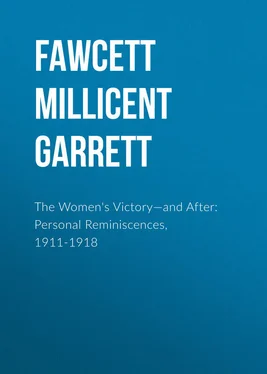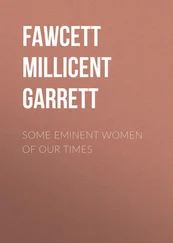At this time we derived a sort of sorry consolation by the articles which appeared in the Press on the expiration of the twenty years during which the development of motor travelling in this country had been held back by ignorant legislation. The public were reminded that the first Act passed by Parliament in regard to automobile traffic enjoined that motors must not exceed the pace of four miles an hour, and must be preceded by a man on foot waving a red flag! The moral for us was that if our legislators could so little read the signs of the times in regard to a comparatively simple matter like the development of motor transport, it was not astonishing that they were at least as incapable of reading the signs of the times in regard to a great human movement which was gradually, in almost every part of the world, raising the position of women from absolute subjection to free citizenship. Our spirits were raised, too, by the fact that, though we were not winning in our own Parliament, we were winning in other Parliaments and everywhere else. A Czech woman had been returned to the Diet in Bohemia; and three new States were won for suffrage in the U.S.A. Barriers in other directions were everywhere breaking down. The very same papers which reported Mr. Asquith's reception of the antisuffrage deputation in December, 1911, when he confessed his unaltered and unalterable opposition to women's suffrage, also contained the announcement of the election of the first woman to the fellowship of the Royal College of Surgeons. The more intelligent of the antisuffragists, such as Mrs. Humphry Ward, were constantly proclaiming their sympathy with every step in the development of women's freedom which had already been won, such as their share in, and responsibility for, local government. In her society she was at the labouring oar, and must have been conscious that no popular movement could exist whose programme offered nothing but negatives. She felt the need of a positive programme, and even announced her intention of using the machinery of the Society for Opposing the Extension of the Parliamentary Suffrage to Women for promoting their activity in Local Government and the election of women to Local Government bodies. But she was sharply pulled up for this by Lord Curzon, who said at a meeting of the society, as reported in the Antisuffrage Review : "The funds we collect are given primarily, and I think exclusively , for resistance to the parliamentary vote for women. It is for that purpose, and that purpose alone , that our organization exists… I hope you will be quite clear about that." Of course Mrs. Humphry Ward had to give way. Had she not just said at this same meeting "how necessary was the maintenance of the male hand upon the helm of English Government"? But the male hand of the politician is capable of adaptability to changed circumstances. Lord Curzon, twenty years earlier, had succeeded in reversing the decision of the Royal Geographical Society to elect women as Fellows – an innovation which he then considered "most injurious to men and disastrous to women." Further experience must have convinced him that this injury to men and disaster to women would be a source of strength to the society; for when he found himself in the position of President of the R.G.S., and responsible with others for the increased cost of far larger and more commodious premises, he himself promoted and, I believe, proposed the election of women to the society. Council's opinion was taken, and was to the effect that "on the true construction of the charter and by-laws women were admissible." The noble President therefore had the solace of finding that the law was on his side when he said, "Ay."
The difference between Mrs. Humphry Ward and her chief in 1912 may have been the prototype of the greater difference which divided them in 1918. But at the earlier date it was Mrs. Ward who wished to go forward, and Lord Curzon who resolutely refused to follow; in 1918 the rôles were reversed. It was Lord Curzon who bowed to the inevitable and Mrs. Ward who vehemently protested that the "male hand" had betrayed her. 4 4 See correspondence in the Morning Post , January 14th to 21st, 1918.
We now resume the thread of our story in 1912 after the defeat of the Conciliation Bill by 14 votes on March 28th. One of its results was the change in the election policy of the N.U.W.S.S. described in the last chapter. Outside of this, our work was concentrated on securing all possible support for the women's suffrage amendments to the Government Franchise Bill. One important advantage was gained when Mr. Redmond gave a definite promise that his party would be left free to vote on women's suffrage according to their personal convictions. The Irish Nationalists, who had in a body deserted the Conciliation Bill, had been very severely criticized for this by their own supporters, both in this country and in Ireland.
Конец ознакомительного фрагмента.
Текст предоставлен ООО «ЛитРес».
Прочитайте эту книгу целиком, купив полную легальную версию на ЛитРес.
Безопасно оплатить книгу можно банковской картой Visa, MasterCard, Maestro, со счета мобильного телефона, с платежного терминала, в салоне МТС или Связной, через PayPal, WebMoney, Яндекс.Деньги, QIWI Кошелек, бонусными картами или другим удобным Вам способом.
This pointed to the probable application of the Parliament Act to the proposed Reform Bill.
In view of the promise which had just been exacted of me not to use violence towards the Chancellor, the presence of his wife and daughter might have been explained on the hypothesis that in the event of assault and battery on our part they could have flung their persons between their husband and father and his assailants. But this possible explanation of the presence of these ladies did not occur to me at the time.
Antisuffragists in the country had taken up the campaign of calumny against us, and had spoken of suffragists as "purveyors of vile literature," disseminators of "pestilential doctrines," and had used other flowers of rhetoric of the same description.
See correspondence in the Morning Post , January 14th to 21st, 1918.












